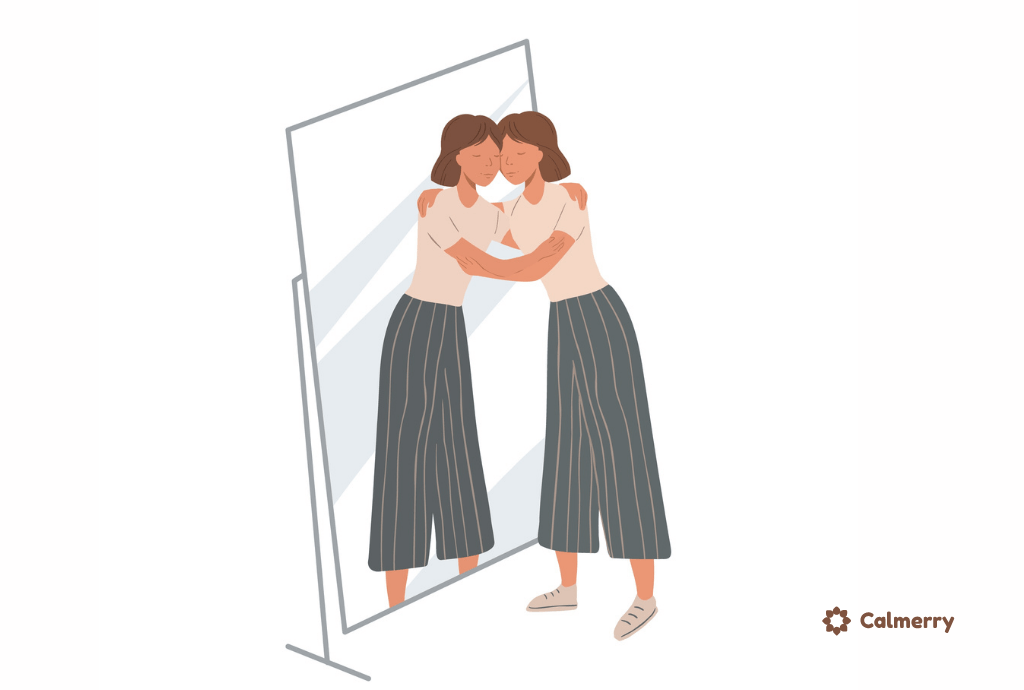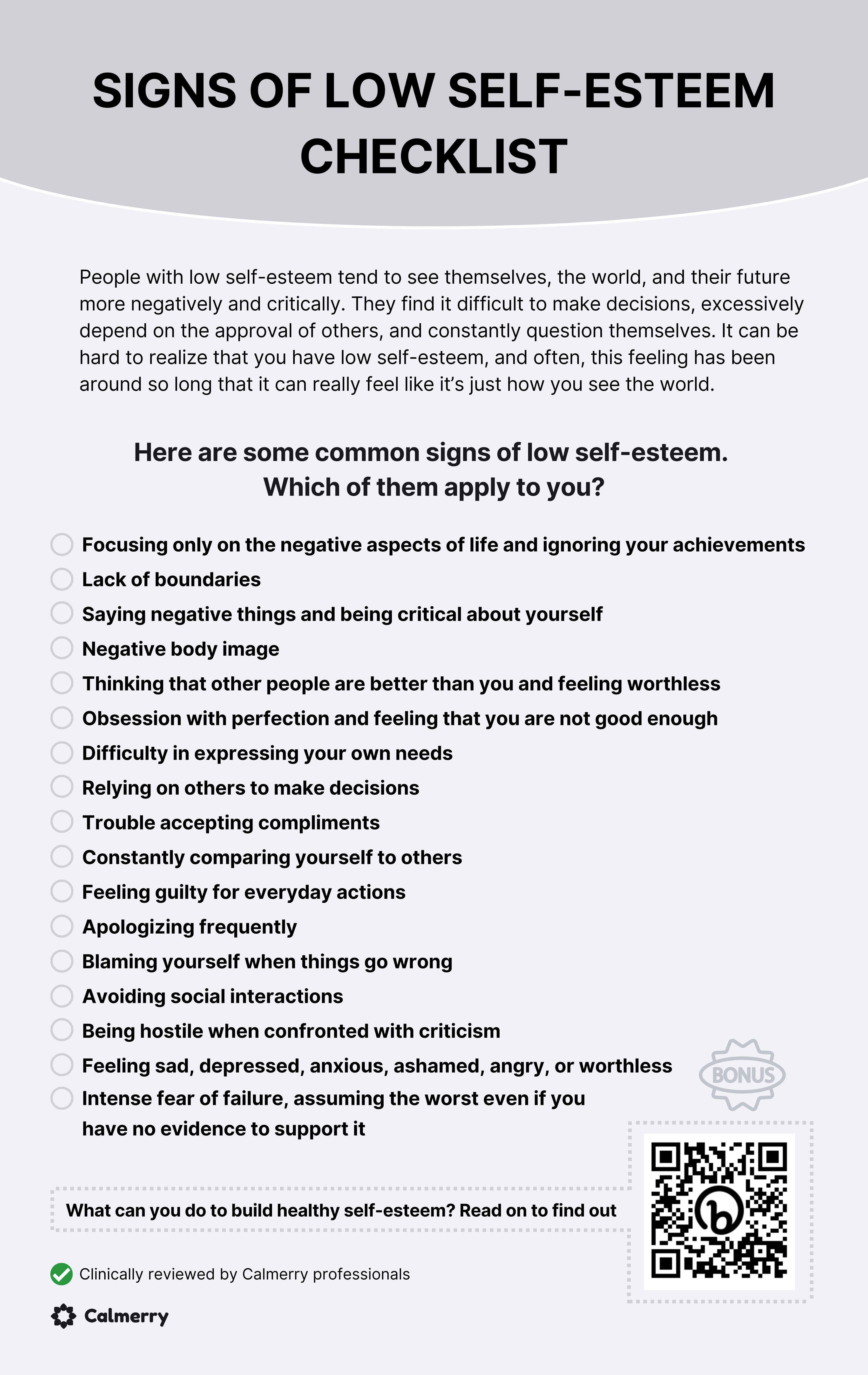Women and Low Self-Esteem: What’s the Connection?

In this article
Self-esteem is the opinion that you hold of yourself. If you have low self-esteem, it means that you may hold a negative view of your abilities, character, or appearance.
Sadly, women are more likely to be affected by low self-esteem than men. This is especially true in Western cultures, where the gender gap is significantly greater. In this article, we will look at why women are affected by low self-esteem and the steps you can take to boost the way that you feel about yourself.
Why is self-esteem important for a woman?
Self-esteem describes the way that you feel about yourself. Healthy self-esteem allows you to like who you are and feel proud of your achievements. It generally leads to higher levels of overall satisfaction, as well as confidence in your decisions and actions.
Conversely, women with low self-esteem are typically critical of themselves. If you have low self-esteem, you may feel unhappy or dissatisfied with your life, you may worry about making the right decision, or feel uncertain about the path your life is taking.
When you have low self-esteem, it can be difficult to recognize your positive qualities, and you may feel inferior to those around you.
The good news is that you can work on your self-esteem to improve the way you feel about yourself. Many types of self-care will allow you to learn to give your body and mind the respect she deserves.
What causes low self-esteem in a woman?
Common sources of low self-esteem might include:
- Finding school challenging and therefore feeling academically inferior
- Criticism by parents in early childhood
- Relationship breakdowns, financial hardship, chronic illness, and other stressful life events
- Being in an abusive relationship.
Although all of these events can affect men, even in cross-cultural studies, men are generally found to have higher levels of self-esteem than women. Scientists have therefore discounted an outdated view that self-esteem is a peculiarity of Western culture. Universal mechanisms that are not dependent on culture or society could therefore be at play in increasing the risk of low self-esteem in women.
Biological, genetic, or hormonal processes that transcend geographical location or cultural context could therefore be crucial to understanding low self-esteem in women.
Researchers have hypothesized that differences between men and women occur as a result of sex role socialization. In this process, the two sexes exploit different sources to boost their self-esteem. Sadly, women may look to beauty magazines for validation, which could conversely lead to feelings of inadequacy.
Women also embrace different criteria for self-evaluation, which may lead to a harsh internal critique of their qualities. Finally, women perceive a greater value in appraisals than men do. Any negative feedback received may therefore threaten previously healthy self-esteem or worsen existing negative feelings.
Common signs of low self-esteem in a woman
The common signs and symptoms of low self-esteem in women include:
- Being extremely critical of yourself
- Ignoring your positive qualities
- Associating negative words with your body or mind, such as fat, stupid, or ugly
- Blaming yourself for errors over which you had no control or for which multiple factors were at play
- Assuming that positive outcomes occurred as a result of luck rather than your own hard work or expertise
- Seeing yourself as inferior to others
- Negative self-talk (your inner dialogue) that is critical or self-blaming
- Rejecting any compliments you receive and being unable to believe that these compliments are true.
People with low self-esteem tend to see themselves, the world, and their future more negatively and critically and constantly question themselves. But it often can be hard to realize that you have low self-esteem, especially if this feeling has been around so long that it can really feel like it’s just how you see the world.
Download this free worksheet with a list of common signs of low self-esteem to find out if any of them apply to you. Find it in PDF format here 👉🏼 Signs of Low Self-Esteem Checklist

Effect on quality of fife
Having low self-esteem can quickly begin to affect your quality of life. Negative feelings about yourself can translate into anxiety or depression, and this can impact the relationship you have with yourself and others.
Some women may become perfectionists to counteract what they see as personal imperfections, while others may stop trying to achieve goals for fear of failure. Some women worry about being judged by others.
When self-esteem is low, it can make it hard to be resilient against life’s challenges. One stressful event can significantly upset the balance in a woman with low self-esteem
Effect on mental health
Chronically low self-esteem can lead to feelings of hopelessness or worthlessness. When a woman has lost sight of anything good about herself, she may neglect self-care, such as personal hygiene, or abuse alcohol or drugs.
Women may also have thoughts of self-harm.
How to improve your self-esteem as a woman – 5 strategies
Reassuringly, it is possible to improve self-esteem. The first step is to take time to nourish the respect you should have for yourself. We suggested self-esteem activities for women are a good place to start as you learn to cherish yourself.
1. Develop self-care as a daily routine
Self-care is a great way to develop healthy self-esteem. Believing that you are worthy of love and respect can take time, but treating yourself well is the first step.
You may choose to build self-esteem by setting time aside for a luxurious bubble bath or to read a book, take exercise or complete a craft activity. These forms of self-care will gradually show you that you are worthy of your own care and respect. Learning your own value and worth will help you to recognize that you also deserve to be treated respectfully and lovingly by others.
2. Set boundaries
As women, we often juggle multiple relationships. Our children, partners, parents, friends, and colleagues may all demand something of us at the same time, and supporting the needs of everyone else can take its toll.
Set healthy boundaries to ensure that you avoid becoming burnt out. If you are struggling with self-esteem, putting a boundary in place may feel like a failure. But it is vital to take care of yourself as well as those around you. Even asking your child to wait for five minutes whilst you finish your coffee may give you the time you need to recharge and be a better parent than if you rush to meet their every demand.
3. Consider counseling
Online therapy is a great way to give yourself time to work on your self-esteem. A therapist can objectively help you to see all the many qualities you may have overlooked or rejected. Working with a professional can give you the courage to accept that you are far more successful than you give yourself credit for.
4. Exercise
Physical movement and exercise release endorphins, giving us a happy rush. Whether you set out for a brisk walk, a jog, or a cycle, you may find that you feel far better about yourself when you return home.
5. Challenge negative self-talk
If you notice that you engage in negative self-talk, make a conscious effort to pay attention to what you are saying about yourself. It may take some practice or even a second opinion, but find objective evidence that your negative thoughts are untrue.
Acknowledge and accept compliments from others. If something positive happens, take credit for it rather than brushing it off as luck. Write a list of things you like about yourself and keep adding to it each day.
Final thoughts
Across the world, low self-esteem is more common in women than men. Low self-esteem can quickly affect your quality of life and may even have an effect on your mental health.
Trying some self-esteem activities for women can help you to turn the volume down on negative self-talk and give you a chance to appreciate yourself for all of your positive qualities.
Accessing online therapy can be a great way to get started on boosting the way you feel about yourself for healthier self-esteem.
online therapy
live video session




